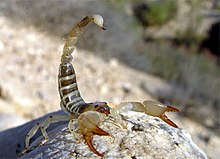Scorpio (genus)
| Scorpio | |
|---|---|

| |
| Scorpio maurus palmatus | |
| Scientific classification | |
| Domain: | Eukaryota |
| Kingdom: | Animalia |
| Phylum: | Arthropoda |
| Subphylum: | Chelicerata |
| Class: | Arachnida |
| Order: | Scorpiones |
| Family: | Scorpionidae |
| Genus: | Scorpio Linnaeus, 1758 |
| Type species | |
| Scorpio maurus Linnaeus, 1758[1] | |
Scorpio is a genus of scorpions belonging to the family Scorpionidae. The species in this genus are found in northern Africa and western Asia.[1]
Species
Scorpio was regarded as a monotypic genus for a long time, containing one widespread and highly variable species, S. maurus, which had many subspecies. It has since been recognised that within S. maurus sensu lato there were a number of taxa which should be regarded as valid species and new species have been described from sub-Saharan Africa:[2][3][4]
- Scorpio birulai Fet, 1997
- Scorpio fuliginosus (Pallary, 1928)
- Scorpio hesperus Birula, 1910
- Scorpio maurus Linnaeus, 1758
- Scorpio mogadorensis Birula, 1910
- Scorpio niger Lourenço & Cloudsley-Thompson, 2012
- Scorpio punicus Fet, 2000
- Scorpio occidentalis Werner, 1936
- Scorpio savanicola Lourenço, 2009
- Scorpio sudanensis Lourenço & Cloudsley-Thompson, 2009
- Scorpio weidholzi Werner, 1929
References
- ^ a b Fet, Victor; Sissom, W. David; Lowe, Graeme; and Braunwalder, Matt E. (2000). "Scorpionidae". Catalog of the Scorpions of the World (1758-1998). New York Entomological Society.
- ^ "A new species of Scorpio from Niger". The Scorpion Files. 3 October 2012. Retrieved 2 February 2022.
- ^ Wilson R. Lourenço; John L. Cloudsley-Thompson (2012). "About the enigmatic presence of the genus Scorpio Linnaeus, 1758 in Congo with the description of a new species from Niger (Scorpiones, Scorpionidae)". Serket. 13 (1/2): 1–7.
- ^ Wilson R. Lourenço (2009). "Reanalysis of the genus Scorpio Linnaeus 1758 in sub-Saharan Africa and description of one new species from Cameroon (Scorpiones, Scorpionidae)" (PDF). Entomologische Mitteilungen aus dem Zoologischen Museum Hamburg. 15 (181): 99–113.
